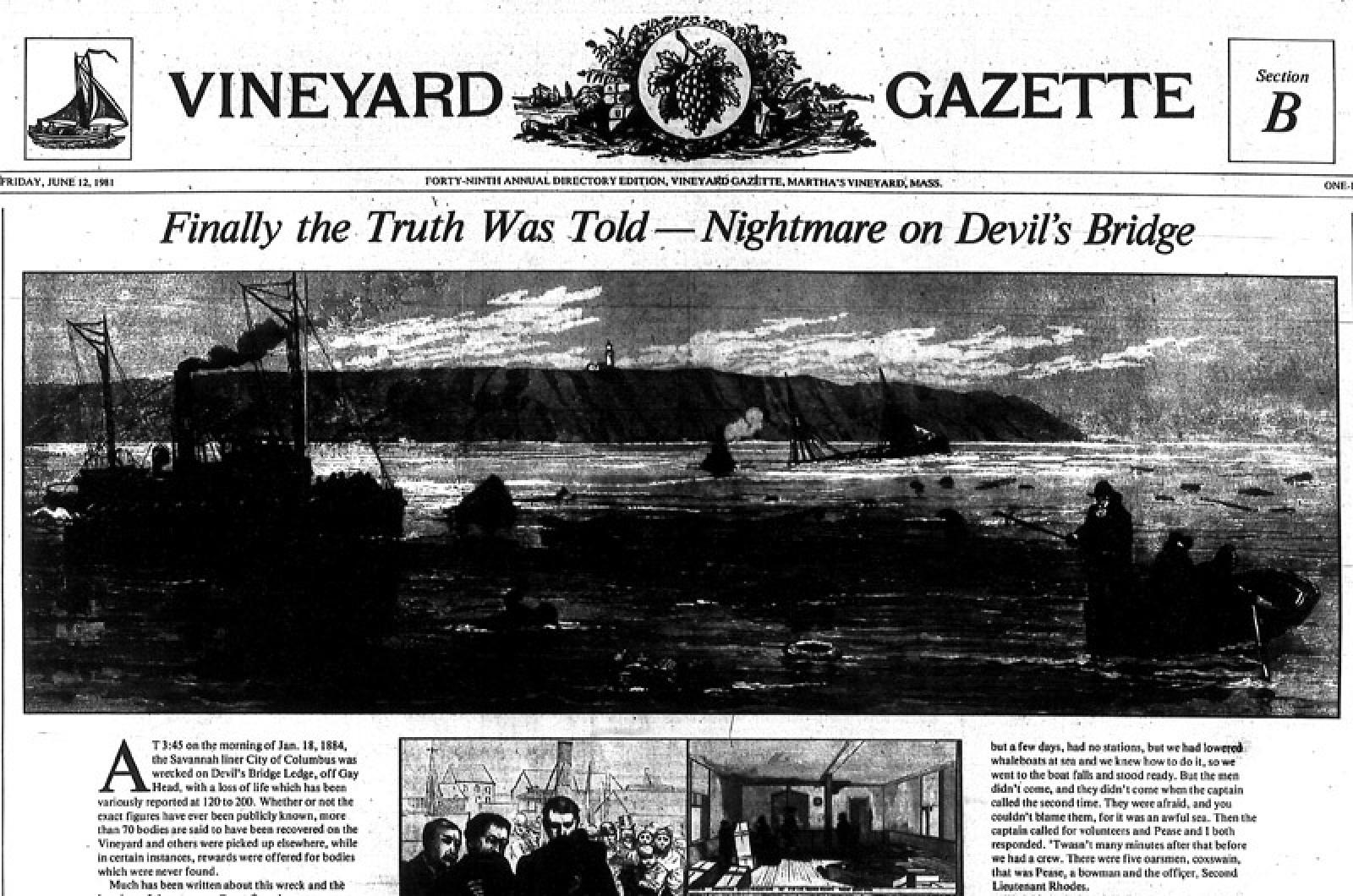From the Jan. 19, 1940 edition of the Vineyard Gazette:
On Jan. 18, 1884, the steamer City of Columbus was wrecked on the Devil’s Bridge at Gay Head. Henry A. Edson of Edgartown recalls that he was working in Brockton at the time, in a building which looked out upon the railroad station. He noticed a special train pull into the station, and his interest was aroused. He went over to the railroad tracks and learned that the train was taking survivors of the City of Columbus from Woods Hole to Boston.
Throughout all these years he has never forgotten that first hand glimpse of the tragedy which is one of the most famous in the annals of the coast.

With the setting of poles this week by a crew of the telephone company, construction has started upon the line which will carry electric service to the town of Chilmark.
Following the setting of the poles, the Cape & Vineyard Electric Co. will have a contractor erect the cross arms and other equipment. James M. Lumbert, Island manager of the company, said he believed the entire construction work might be completed by March.

Although the voters of West Tisbury will vote for their town officials this year by the Australian ballot system, which necessitates the filing of nomination papers by the candidates, the election will be handled according to time honored principles, and the meeting will convene with everyone knowing exactly how the results will read. Allan Keniston, who has served as selectman for a number of years, is retiring from office, and will be succeeded by Otis E. Burt. In like manner, Leroy Bosworth was secured for the office of school committee, when Horace Athearn declined to serve further. Neither office is contested, and the choice in each instance being a popular one, the result of the election can be recorded now, with election day still weeks off. The town meeting comes Feb. 6.
Other town officials, running for reelection, have filed their nomination papers, it being a legal requirement. The introduction of this “new-fangled” system, which was voted last year, interferes not a bit with the customs and practices of this town, the newest, in point of the issuance of its charter, but the seat of the Island’s second oldest government.
From early colonial days, West Tisbury, as it is known today, was the scene of political strength and activity. Although there were political contests in early days when the township included all that is now the town of Tisbury, the town has been well nigh free from such matters since its incorporation forty-eight years ago. The rule has been that the office has sought the man, and the man, once elected, has usually served until age, infirmity or death has necessitated a successor. In such manner has George G. Gifford served as town clerk, never having been opposed for election since he was first sworn into office nearly fifty years ago, who died in office. Although it is a trifle at variance from the regular procedure for officials to retire before age makes it necessary, the prevalence of old principles is seen in the selection of their successors this year.
Until this year all West Tisbury officials were elected by ballots written by the voters upon such scraps of paper as they might choose to bring into the town meeting. Gay Head is now the only Island town employing this method, which has survived from very early days.
Humourous tales have been handed down through the generations regarding this practice. Paper was not only expensive but scarce in early times, and there were town elections held when men could not obtain paper upon which to write the name of their favored candidates. Small pieces of shingle were used at times, and complaints were made that the shape of some of these indicated the existence of a political plot, as indicated by the evident fact that one man had whittled out several ballots. Again, certain thrifty forefathers of the hamlet picked up some of the ballots used in town meeting and saved them for another year, as they still had a blank side. But they forgot to cross out the name voted upon the year previous, and thus threw the election into confusion for a time.
These and various other tales have been told of the elections held in West Tisbury, dating chiefly, from the “days before the separation.” Because, since that time, there has never been any confusion in the West Tisbury town meetings. Informal sessions by the town elders have resulted always in the satisfactory disposal of all public matters, and the town has always prided itself on the record of being able to transact all business, elect all town officers and wind up its annual sessions in time for dinner. The Australian ballot system has been adopted, and other modern touches introduced into the handling of town affairs, but West Tisbury, always a law unto itself, holds its course of progress, straight and true, as plotted by its elders in days gone by.
Compiled by Hilary Wall
library@mvgazette.com




Comments
Comment policy »